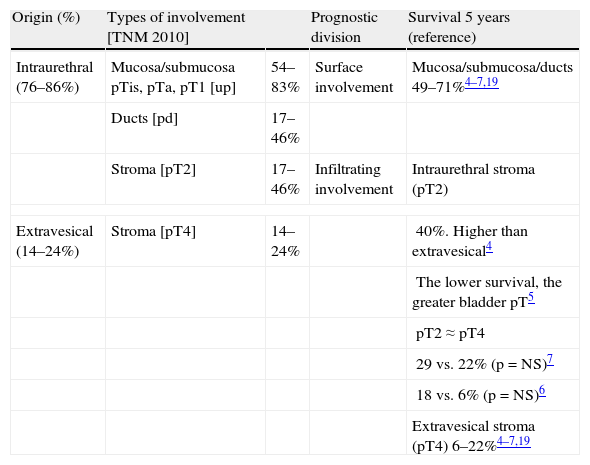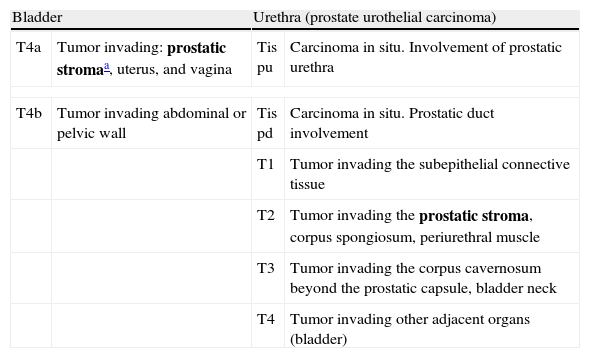Urothelial carcinoma (UC) is a multifocal disease that may develop in any location of the urinary tract, including the prostate. We analyze the types of prostate diseases due to UC, their diagnosis, risk factors and the clinical implications of this entity.
Material and methodsAnalysis of original, review articles and publications related to prostate involvement due to UC. The study included works published in the period of 1985–2011, most of which were obtained from the search in PubMed.
ResultsProstate involvement due to UC has been observed frequently in both non-muscle infiltrating bladder cancer (NMIBC) series and prolonged follow-up (39%) as in radical cystectomy series (15–48%). Prostatic involvement may occur in the mucosa and ducts (superficial involvement) or prostate stroma (infiltrating involvement), a fact that has prognostic and therapeutic implications. Stromal involvement may have both a bladder and intraurethral origin. Carcinoma in situ (CIS), multifocality, bladder neck/trigone cancer, and previous history of tumor recurrence are the factors that have been more consistently associated to prostate involvement due to UC. The incidence of prostatic involvement by UC in patients with NMIBC increases over time when risk factors exist. In these cases, a prostatic urethral biopsy should be performed during the follow-up. Conservative treatment with transurethral resection and BCG is possible in case of superficial involvement of the prostatic urethra, assuming its risk of progression. Patients subject to cystectomy and with prostate involvement due to UC have a greater risk of urethral recurrence. The elevated incidence of prostatic adenocarcinoma and prostatic involvement by UC in cystectomy sections makes it necessary to be very selective when indicating prostate-sparing cystectomy. Chemotherapy may be an option in an attempt to improve survival of patients with prostatic stromal involvement.
ConclusionsProstatic involvement by UC is not uncommon and it has important implications in the management of patients with NMIBC and in those who have an indication for or have undergone radical cystectomy.
El carcinoma urotelial (CU) es una enfermedad multifocal que puede desarrollarse en cualquier parte de la vía urinaria incluyendo la próstata. Analizamos los tipos de afectación de la próstata por CU, su diagnóstico, factores de riesgo y las implicaciones clínicas de esta entidad.
Material y métodosAnálisis de artículos originales, de revisión y publicaciones relacionadas con la afectación por CU de la próstata. Trabajos publicados en el periodo 1985-2011 y obtenidos mayoritariamente la búsqueda en PubMed.
ResultadosLa afectación prostática por CU se ha observado con frecuencia tanto en series de tumor vesical no músculo-infiltrante (TVNMI) y seguimiento prolongado (39%), como en series de cistectomía radical (15-48%). La afectación prostática puede producirse a nivel de mucosa y ductos (afectación superficial) o estroma prostático (afectación infiltrante), hecho que tiene implicaciones pronósticas y terapéuticas. La afectación estromal puede tener a su vez un origen vesical o intrauretral. Cis, multifocalidad, tumor en cuello vesical/trígono, e historia previa de recidiva tumoral, son los factores que se han asociado con mayor consistencia a la afectación por CU de la próstata. La incidencia de afectación prostática por CU en pacientes con TVNMI se incrementa con el tiempo si existen factores de riesgo. En estos casos es aconsejable la realización de biopsias de uretra prostática durante su seguimiento. Es posible el tratamiento conservador con resección transuretral y BCG en caso de afectación superficial de uretra prostática, asumiendo su riesgo de progresión. Los pacientes sometidos a cistectomía y con afectación por CU de la próstata tienen mayor riesgo de presentar recidiva uretral. La elevada incidencia de adenocarcinoma prostático y de afectación prostática por CU en piezas de cistectomía obliga a ser muy selectivo al indicar cistectomía con preservación de próstata. La quimioterapia puede ser una opción en un intento de mejorar la supervivencia de pacientes con afectación prostática estromal.
ConclusionesLa afectación prostática por CU no es infrecuente y tiene importantes implicaciones en el manejo de los pacientes con TVNMI, así como en los que tienen indicación o han sido sometidos a cistectomía radical.










